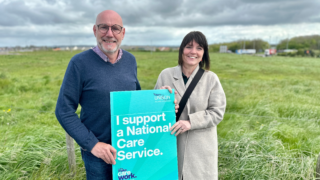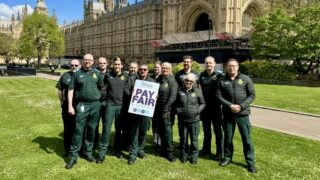UNISON has today (Thursday) called on private social care providers in Somerset to sign up to its Care Worker Safety Charter and take immediate action to protect care workers, service users and communities against Coronavirus.
The six standards in UNISON’s charter outline simple steps care providers can take to adequately protect workers. The measures include ensuring care workers have access to testing and the personal protective equipment they need, committing to ensuring that no care worker loses their job or income as a result of Coronavirus, and that care workers have a say on how to keep their workplace safe in the future.
The charter launch follows calls from care workers in Somerset saying they feel forgotten and let down by employers. UNISON has received reports of poor personal protective equipment provision, inadequate health and safety measures and punishing sick pay policies.
Over the coming weeks UNISON expects care providers to sign up to the charter and work with the trade union to implement these minimum standards in their workplaces. A list of Somerset’s best-performing care homes will be published and those providers not meeting the basic standards will also be named.
UNISON South West regional manager Kerry Baigent said:
“With around one in four Coronavirus deaths in Somerset care homes being attributed to Coronavirus, it’s clear that social care is going to continue to be the frontline of the Coronavirus pandemic for months to come.
“Therefore it’s vital that care providers take immediate and effective action to not only protect the health and welfare of the workers caring for our most vulnerable, but to also help slow the spread of Coronavirus through our communities. This charter is an opportunity for care providers to show that they are meeting the scale of the challenge and are helping lead the way in the Somerset’s fight against Coronavirus, with care workers at the heart of their effort.”
UNISON steward and Somerset care worker Shelly said:
“Care workers do everything they can to protect vulnerable residents and we want employers to work with us to do the same. We want to be able to do our jobs and care for residents in the knowledge that we’re as safe as possible and not at risk of passing a potentially deadly infection on to elderly residents or our families.
“Adequate personal protective equipment and robust health and safety practices in care homes are basic steps toward keeping everyone safe”.
A pregnant carer working in a private care home said:
“Getting the adequate support and protection in the care home was an uphill battle from the beginning. Despite being pregnant, nothing was done to find me alternative duties and I felt ignored and scared, with little option but to work and hope for the best. No care worker, particularly when they’re in a vulnerable state, should be forced to do that – it puts everyone at risk.”
The six standards UNISON is inviting care homes to commit to are as follows:
- Keep care workers safe
Care workers will have access to the personal protective equipment (PPE) they need under Public Health England guidance and will receive adequate training to use it effectively. - Protect care worker’s pay
If a care worker is required to ‘shield’ under government guidance, is looking after a family member with Coronavirus or is unable to secure childcare for their children they will receive full normal pay whilst on leave. - Protect care worker’s jobs
Care workers should not be dismissed for staying at home to care for themselves or for their family and Coronavirus related absences will be excluded from absence management triggers. - Enable access to testing
If a care worker has reason to seek testing they will not be prevented from doing so by their work commitments and they will not be required to work before the results of the test are confirmed. They will continue to receive full pay in this period and the same will apply if a member of the worker’s household is getting a test. - Make workplaces safe
Suitable measures and arrangements will be put in place to ensure social distancing, proper hand-washing practice and a cleaning and disinfection regime are possible in non-care workplace settings not already covered by PPE provision outlined in standard one. - Establish worker representation
Employers will establish a health and safety committee with trained Health and Safety representatives with free access to independent advice and legal support. This will provide an opportunity for workers to identify (via their representative) any concerns or needs they have in the health and safety provision and procedures in their workplace and work with management to implement improvements. Future risk assessments will take place in consultation with these Health and Safety representatives.





